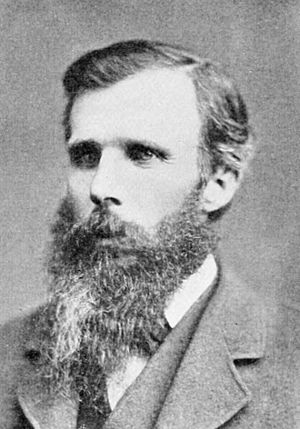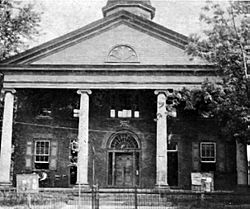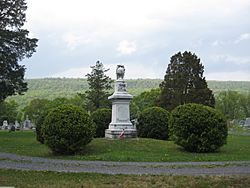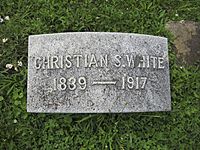Christian Streit White facts for kids
Quick facts for kids
Christian Streit White
|
|
|---|---|

Portrait of Christian Streit White
|
|
| President of the West Virginia Fish Commission | |
| In office 1885–? |
|
| Preceded by | Henry B. Miller |
| Clerk of Court for Hampshire County | |
| In office 1873–1902 |
|
| Preceded by | James A. Parsons |
| Succeeded by | Charles W. Haines |
| Clerk of Circuit Court for Hampshire County | |
| In office 1873–1876 |
|
| Preceded by | C. M. Taylor |
| Succeeded by | V. M. Poling |
| Personal details | |
| Born | March 10, 1839 Romney, Virginia (now West Virginia), United States |
| Died | January 28, 1917 (aged 77) Romney, West Virginia, United States |
| Resting place | Indian Mound Cemetery, Romney, West Virginia, United States |
| Political party | Democratic Party |
| Spouses |
|
| Relations |
|
| Children |
|
| Residences | 332 East Main Street Romney, West Virginia |
| Alma mater | Potomac Seminary |
| Occupation |
|
| Military service | |
| Allegiance | |
| Branch/service | |
| Years of service | 1861–1865 |
| Rank | |
| Unit | 13th Virginia Infantry 23rd Virginia Cavalry |
| Battles/wars | American Civil War |
Christian Streit White (March 10, 1839 – January 28, 1917) was an American military officer, lawyer, court clerk, fish farmer, and politician. He lived in the states of Virginia and West Virginia.
During the American Civil War, White served as a sergeant major and captain in the Confederate States Army. He also worked for the Confederate Treasury Department. White served under famous generals like Stonewall Jackson and Jubal Early. He was known for keeping Hampshire County's important land records safe from being destroyed during the war. From 1864 to 1865, he led Company C of the 23rd Virginia Volunteer Cavalry Regiment.
After the war, White became the Clerk of Court for Hampshire County, West Virginia, for 29 years (1873–1902). He also led the Democratic Party in Hampshire County, helping many more people join the party. White was one of the first people appointed to the West Virginia Fish Commission by Governor John J. Jacob. He even started a fish hatchery near Romney and later became the commission's president.
White came from a well-known political family in Virginia and West Virginia. His father, John Baker White, was also a Clerk of Court. His grandfather, Robert White, was a respected judge. His brother, Robert White, became the Attorney General of West Virginia.
Contents
Christian Streit White's Early Life
Christian Streit White was born on March 10, 1839, in Romney, which was then part of Virginia (now West Virginia). He was the second son of John Baker White, who was the Clerk of Court for Hampshire County. His mother was Frances Ann Streit White. His grandfather was the well-known Virginia judge Robert White.
His older brother, Robert White, later became the Attorney General of West Virginia. Christian was likely named after his mother's father, Reverend Christian Streit, a Lutheran minister from Winchester, Virginia. Christian Streit White went to school at Potomac Seminary in Romney.
Serving in the American Civil War
On April 19, 1861, when the American Civil War began, Christian Streit White joined the Hampshire Guards as a private. This group later became Company K of the 13th Virginia Volunteer Infantry Regiment. White quickly moved up in rank, becoming a Third Sergeant. He was later promoted to Sergeant Major.
White served in the 13th Virginia Infantry for over a year. He had to leave the service because he got typhoid fever. He recovered in a hospital in Staunton.
After getting better, in the winter of 1862 and 1863, White worked as a clerk in the Confederate States Department of the Treasury in Richmond. He later became the head of a whole section of that department. His father, John Baker White, also worked there until he passed away.
In spring 1863, White was healthy enough to serve in the cavalry (soldiers on horseback), though he couldn't serve in the infantry (foot soldiers).
Leading a Cavalry Company
White left his job at the Treasury Department when Confederate President Jefferson Davis made him a Captain. As a Captain, White was tasked with gathering a company of 200 cavalrymen for "special service." These soldiers would act as reconnaissance scouts or espionage (spy) personnel in areas controlled by the Union.
White's company became Company C of the 23rd Virginia Volunteer Cavalry Regiment. He started with 20 men and eventually had 300, though he was only allowed to keep 120. His brother, Alexander White, served as the company's first lieutenant. Christian Streit White stayed in command of his company until the war ended in 1865.
White and his company fought in many battles and skirmishes from early 1864 to early 1865. In the summer of 1865 alone, they were in 56 fights. White himself was wounded three times during the war, one wound being severe. He felt the effects of these wounds for the rest of his life. Throughout his military service, White fought under the commands of generals Stonewall Jackson and Jubal Early.
After General Robert E. Lee surrendered on April 9, 1865, White and his remaining soldiers tried to join General Joseph E. Johnston's forces in North Carolina. However, Johnston had already surrendered. White and his company then disbanded without officially surrendering. White returned home to Romney around June 1, 1865.
Saving Hampshire County's Records
Christian Streit White's father, John Baker White, was the Clerk of Court for Hampshire County. When Union Army forces advanced on Romney, he worried about the county's important land records. He loaded the large record books onto wagons and sent them to Winchester, Virginia, for safety.
In 1863, Winchester became unsafe. Christian Streit White took over the responsibility for the records. He moved them to Front Royal. When Front Royal also became dangerous, White moved the records again, this time to Luray Caverns, a cave system, where they stayed for several months.
In fall 1864, Union Army troops were destroying records that had remained in the courthouse. White and his company rescued about 150 record books. They loaded them into a wagon and took them to North Carolina, where they stayed safe until the war ended. Because of White's efforts, Hampshire County's land records survived the war and were returned to the courthouse.
Christian Streit White's Political Career
Clerk of Court for Hampshire County

After returning home in June 1865, White couldn't immediately go back to being a lawyer or hold public office. This was because of state laws that prevented former Confederate soldiers from doing so. White had not been pardoned for his service.
So, White rented a farm in Hampshire County and became a successful farmer. In 1872, the law changed, allowing former Confederates to hold office again. White was then elected Clerk of Court for Hampshire County. He started his term in 1873. He served in this role for 29 years, until 1902. His father had also been the county's Clerk of Court for 47 years. Together, they served a combined total of 76 years!
Hampshire County Democratic Leader
By 1876, White was the chairman of the Hampshire County Democratic Executive Committee. In this role, he worked hard to get more people to join the West Virginia Democratic Party. Thanks to his efforts, the number of registered Democrats in Hampshire County grew from 449 to 1,369 in just a few years.
White was known for being an independent thinker. He wasn't afraid to speak his mind, even if it went against his own party's leaders. He was described as a "liberal Democrat" who was "fearless in following his convictions."
West Virginia Fish Commission
On February 20, 1877, the West Virginia Legislature created the West Virginia Fish Commission. Its goal was to increase the number of fish in the state's rivers and waters. This was done by raising fish in hatcheries and then releasing them into streams.
West Virginia Governor John J. Jacob appointed White as one of the first commissioners on June 1, 1877. White and his fellow commissioners were very dedicated to their work.
White looked for a good place to build a state fish hatchery. In the summer of 1877, he bought land near Romney called Maguire Springs. He built a fish hatchery there at his own expense. By 1878, the hatchery was working well, and 600,000 fish had been released from it. The West Virginia Fish Commission later bought the hatchery from White. In 1885, White became the President of the West Virginia Fish Commission. He oversaw many improvements and expansions at the hatchery.
The commission introduced many types of fish into West Virginia's streams, including Chinook salmon, trout, black bass, and carp. White even designed special raceways to raise the salmon. The salmon thrived in the South Branch Potomac River and were caught by fishermen all the way to Washington, D.C..
White and his colleagues worked for over a decade without pay from the state legislature. They continued their important work of hatching and stocking fish in West Virginia's waters.
Confederate Memorial Activities

In spring 1866, Christian Streit White, his brother Robert, his sister Fannie, and his future wife Bessie Jane Schultze had an idea. They wanted to build a monument to remember the Confederate soldiers who had died. This idea led to the first decoration of Confederate graves at Indian Mound Cemetery in Romney on June 1, 1866. It also led to the building of the Confederate Memorial there, which was dedicated on September 26, 1867.
White also served as the Commander of Camp Hampshire Number 446 of the United Confederate Veterans. This was the first camp of its kind organized in West Virginia.
Later Life and Death

Christian Streit White continued to serve in public office and practice law with his son Robert late into his life. He passed away in Hampshire County on January 28, 1917, at the age of 77. He was buried next to his first wife, Bessie Jane Schultze, and his second wife, Catharine Steele, in the White family plot at Indian Mound Cemetery in Romney.
Christian Streit White's Family Life
Christian Streit White was a member of the Presbyterian church and a Mason. He lived at 332 East Main Street in Romney.
Marriages and Children
White married Elizabeth "Bessie" Jane Schultze on July 25, 1867. Bessie was born in Rotterdam, Netherlands, and her family was from Scotland. She passed away on June 24, 1869. They had one son:
| Name | Birth date | Death date |
|---|---|---|
| John Baker White | August 24, 1868 | June 2, 1944 |
After Bessie's death, White married Catharine Steele on May 26, 1873. Catharine was born in Belfast or Dublin and moved to the United States when she was seven. She grew up in Fairmont. White and Catharine had four children:
| Name | Birth date | Death date |
|---|---|---|
| Louisa Anna White | March 15, 1874 | January 10, 1931 |
| Robert White | May 28, 1876 | August 15, 1935 |
| Christian Streit White, Jr. | June 10, 1881 | December 2, 1956 |
| Elizabeth "Bessie" Adelphia White Howard | July 23, 1885 |
Catharine passed away in 1911 and was also buried at Indian Mound Cemetery.
Interesting Possessions
Christian Streit White owned several interesting antique items. Some of these once belonged to Thomas Fairfax, 6th Lord Fairfax of Cameron, a famous historical figure. These included a pair of andirons (metal supports for logs in a fireplace) and a fender (a low metal barrier in front of a fireplace).
White also had a beautifully inlaid table made of different types of wood. This table had belonged to his grandfather, Judge Robert White. Underneath the table, there was a small piece of paper where his grandfather had signed his name and the date, 1789. White also owned a sugar bowl from Switzerland that had originally come from China. This sugar bowl had been in the Streit and White families for over 200 years!
 | Selma Burke |
 | Pauline Powell Burns |
 | Frederick J. Brown |
 | Robert Blackburn |

